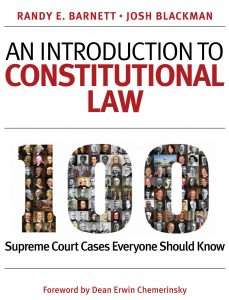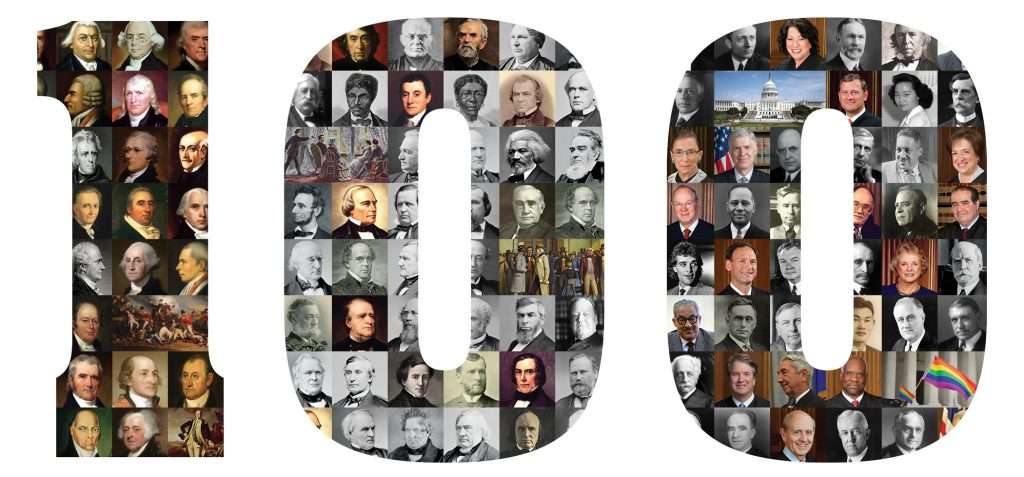The Volokh Conspiracy
Mostly law professors | Sometimes contrarian | Often libertarian | Always independent
An Introduction to Constitutional Law: 100 Supreme Court Cases Everyone Should Know
This book and video series teaches the narrative of constitutional law as it has developed over the past two centuries.

Randy Barnett and I are proud to announce An Introduction to Constitutional Law: 100 Supreme Court Cases Everyone Should Know. All students even those unfamiliar with American history will learn the essential background information to grasp how this body of law has come to be what it is today. Our online library of sixty-three videos brings the Supreme Court's one hundred most important decisions to life. These videos are enriched by photographs, maps, and even audio from the Supreme Court. I will blog previews of our entire video catalogue in the intermediary days between Constitution Day and the first Monday in October.
The book and videos are accessible for all levels: law school, college, high school, home school, and independent study. Students can read and watch these materials before class to prepare for lectures or study after class to fill in any gaps in their notes. And, come exam time, students can watch the entire canon of constitutional law in about twelve hours.
100 Cases has been favorably reviewed by the authors of leading constitutional law casebooks, including Dean Erwin Chemerinsky, who wrote our Foreword.
Erwin Chemerinsky, University of California, Berkeley School of Law
"The descriptions by Professors Barnett and Blackman emphasize what students need to know in order to master this material for their exams and for their careers. Professors Barnett and Blackman present the material with great clarity. The videos provide the students another way of learning the material and wonderfully complement the textual descriptions. Although many of the cases are controversial, Professors Barnett and Blackman present them in an unbiased and ideologically neutral manner."
Sanford V. Levinson, University of Texas at Austin School of Law
"Randy Barnett and Josh Blackman have created a remarkable guide to what they label the 100 most important Supreme Court cases in our history. Students (and their teachers) should especially profit from the multimedia blend of information and analysis. Inevitably there will be quibbles about some few cases included and, therefore, others left out, but if I am typical, most legal academics will agree with at least 90% of their choices, which is impressive indeed. This may prove to be a true event in legal education—and not only for law students."
Jack M. Balkin, Yale Law School
"Barnett and Blackman have made learning the basics of American constitutional law as painless and as fun as possible. The case discussions are concise; the videos are full of fascinating pictures and historical details. If you think you might be interested in Constitutional Law, this is a great way to get started."
Michael Dorf, Cornell Law School
"The pithy, lively, and occasionally opinionated, but always fair-minded chapters and videos provide all of the essentials of the key cases of the constitutional canon, clarifying and summarizing without ever dumbing down."
Mark Graber, University of Maryland School of Law
"A very accessible guide by two outstanding constitutional scholars to many cases that are taught in almost every class in constitutional law and a few cases that should be taught in almost every class in constitutional law."
Keith E. Whittington, Princeton University
"A useful, impressive, and innovative introduction to the history of American constitutional law. Accessible to the beginning student and still helpful to the advanced student. A new approach for a new generation of students. Raises the bar on how to make these complex cases understandable."
Michael Stokes Paulsen, University of St. Thomas School of Law
"Randy Barnett and Josh Blackman have done it again! Two of our nation's most brilliant scholars and teachers of the Constitution have teamed up to create a magnificent set of new teaching materials. 100 Supreme Court Cases Everybody Should Know is an endlessly rich and deeply rewarding resource for understanding the U.S. Constitution. Novices and experts alike will ben- efit from the Barnett-Blackman treasure trove."
William Baude, University of Chicago Law School
"A strong supplement that provides the legal and political context for the most significant Supreme Court cases. It provides important background for all constitutional law students."
The book is currently backordered on Amazon. Please order the paperback, and send a signal to our publisher to print more copies! Or, if you are in a hurry, you can download the E-Book or stream the videos.

Several professors have already adopted this short, accessible $30 paperback as a supplement. If would like a review copy of the book and videos, please contact me.
Editor's Note: We invite comments and request that they be civil and on-topic. We do not moderate or assume any responsibility for comments, which are owned by the readers who post them. Comments do not represent the views of Reason.com or Reason Foundation. We reserve the right to delete any comment for any reason at any time. Comments may only be edited within 5 minutes of posting. Report abuses.
Please to post comments


I'll probably buy the book, but I can't help but think that in a country that wasn't going terribly wrong, the average person wouldn't NEED to know about supreme court cases. The need to care about them is actually an indication of how bad things are getting.
The average person DOESN'T need to know about supreme court cases. They can be blissfully unaware of all these cases and their personal lives won't change a whit.
Yeah, what reason would anyone ever have to acquire a background to support substantively critical thinking about government and society?
Especially the average person.
There are shock articles every once in a while about some poll showing 20% of Americans don't know who is President, or don't know the name of that big body of water between the US and Europe, or don't know how many states are in the US.
Yet somehow all those ignorant people manage to fix cars, get haircuts, and buy groceries. Shocking!
Why? Court decisions are important in Europe and Canada as well. Are things "getting bad" there as well?
In contrast, court decisions are probably less important in China....
Heck, things are substantially worse in Canada and Europe, by my standards. Ideally a person should be able to go about their life without much concern about government and the details of its workings, it should be as invisible as plumbing. Certainly you shouldn't as an average person, (As opposed to a lawyer or layman with an interest in the topic.) have any need to know about 100 Supreme court cases!
That we have to be concerned about the details of it is a bad thing, it means that it is too intrusive.
You're far more concerned about supreme court cases than the average person. Just because a book is called "X YOU NEED TO KNOW" does not make it true for everyone.
I already know the basic cases - Kramer v. Kramer, Alien v. Predator, Freddie v. Jason.
Don't forget Joe v. the Volcano and Scott Pilgrim v. the World.
It's frightening how much modern politics is determined by Bart v. Australia.
...and upon review, I realize that I missed the whole Godzilla line of cases.
Godzilla v. Mothra
Godzilla v. The Smog Monster
Godzilla v. Mechagodzilla
etc.
Serial plaintiff. Probably incarcerated with time on his hands. That is why we need to keep QI.
Thank you. Given who this is coming from, I may offer some push-back later. But assuming you did it well enough, and I do, this looks much needed. Probably a great contribution.
Given that I am not a lawyer, the only ones I know off the top of my head are: Marbury v Madison, Dred Scott, Brown v. BoE, Roe v Wade, Hanging chads, Penaltax, Holmes was a racist fuck, Separate but Equal, democrats Hate Corporations...that's about it.
What about
Schenck v US
Brandenberg v Ohio
NAACP v Alabama (a bit more obscure, yes)
Kelo v New London
Buck v Bell, perhaps.
"Holmes was a racist fuck" covers both Schenk v US and Buck v Bell - except for the misspelling of "fascist".
I don't know what those leftist professors complimenting a book by patriotic cis white men are up to, but you can bet your ass whatever it is won't be good for America!
They think that if they plug a book on Reason, they'll get hair like Robby.
Perhaps the liberal-libertarian mainstreamers -- victors and rulers in American academia -- are trying to be good sports toward the shambling, vanquished conservatives.
When will the Audible version be available?
Once I had kids (twins, 3.5, sitting on my lap as I type this) almost all of my reading has become audio instead - and they listen to the audiobooks too, so this would be a good addition to their education.
Although not specific to your situation, if this book is to be used in public universities and schools, then the ADA would apply where all technology, including websites, instructional materials and online courses, and other electronic and informational technology for use by students or prospective students, is accessible.
Hmmm...I guess that's not an appropriate answer on a blogsite that considers itself "Often libertarian."
Considering the woeful ignorance of the electorate wrt civics, it is really a shame these are not available for free to high schools to use in their civics classes. Perhaps there is a way for this to happen.
I look at this as the authors doing the country a public service.
What exactly is the value of teaching precedent when the method of originalism provides the means of leapfrogging over all of it and re-adjudicating questions from the beginning, without all the unpleasant baggage of "wrong" decisions?
It lets you go on as before without sudden changes, until you've actually demonstrated those decisions were wrong.
Congratulations on the book! I like that there are videos to go along with them.
That's great, but does it have a scratch and sniff feature?
Good idea.
There are probably some stinkers among the 100 cases.
Looks like the right 100 cases, certainly the ones I would pick, though I'm not sure the average citizen needs to know them.
1) Congratulations (and respect) to the new parents!
2) Levinson blurb snippet: "...if I am typical, most legal academics will agree with at least 90% of their choices,..."
LSAT (ok, SAT-Q) practice question: What's the largest value of x which makes the below sentence true?
If most legal academics *do* agree with at least 90% of the book's choices, it follows that at least x% of the book's choices are agreed with by most legal academics.
Zero.
It sounds like a great book!
The title alone convinces me, however, that the goal expressed therein is impracticable. Not everyone wants to know 100 Supreme Court decisions. My guess is that a substantial majority even of voting Americans don't want to invest the time to learn 100 decisions, even if the book were free. 'Tis a pity, but 'tis true. I'm not sure what word or phrase ought replace "everyone" in the book's title, but it's so obviously impracticable as to make me wonder it it's not intended sardonically.
In which case, bravo, you got me, and I salute you.
If a majority of any sort of voting Americans were remotely as informed as we should be, our political climate would be impressively better and so would our nation. We can dream from time to time, no?
Not a law student, so I don't have a prof to ask, but just to make sure ... video access is available to all purchasers of the book in whatever format?
Correct (as long as the number of legal academics exceeds 17, which it obviously does).
Above comment responds to Voize of Reazon's "Zero"